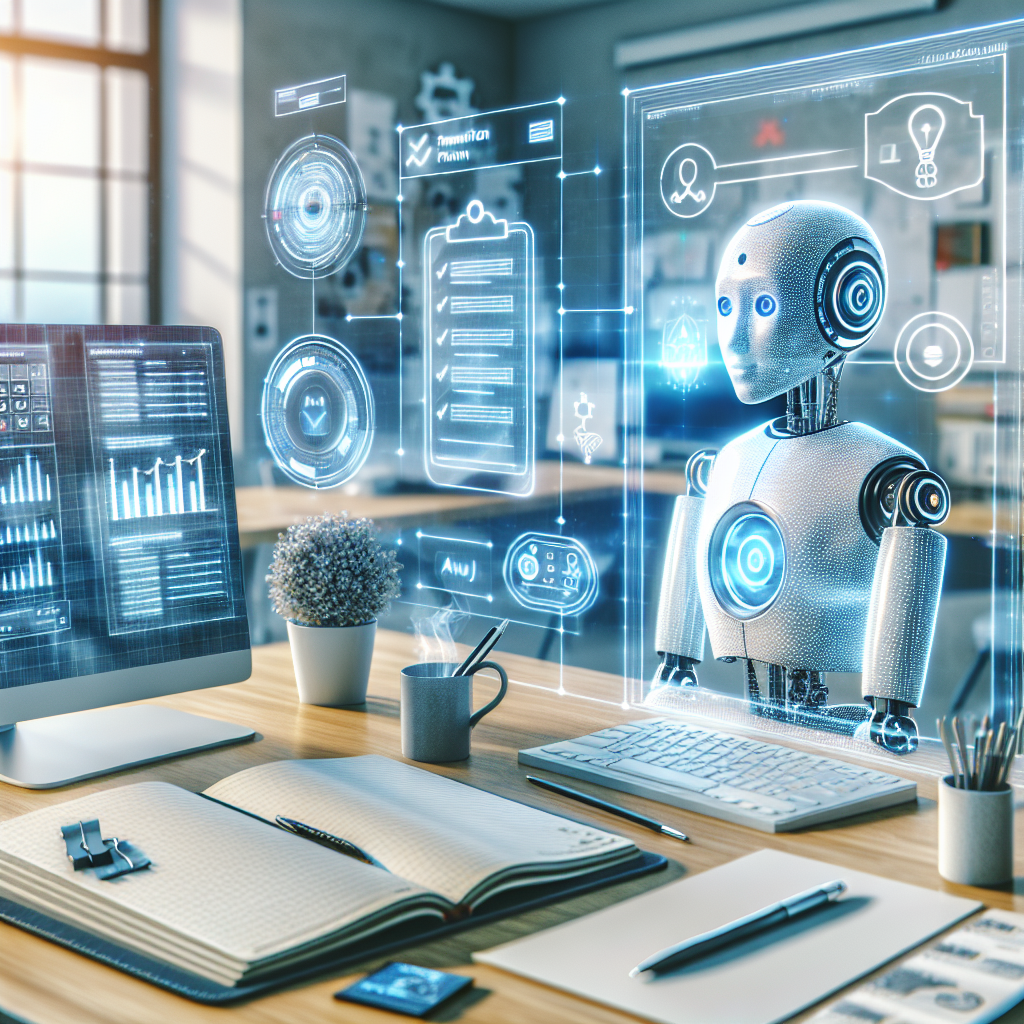Revolutionizing Daily Planning: How AI Agents Are Transforming Personal Productivity
In the ever-evolving landscape of personal productivity tools, a new player has emerged that promises to redefine how we approach daily planning and task management. Artificial Intelligence (AI) agents, once the stuff of science fiction, are now becoming a tangible reality for everyday users. This technological leap forward is not just impressive; it’s poised to fundamentally change the way we interact with our digital assistants and manage our time.
One developer’s recent experiment in creating an AI agent for his daily planning app has shed light on the incredible potential of these intelligent systems. By leveraging the power of machine learning and natural language processing, this AI agent can perform tasks that would typically require human intervention, from scheduling gym sessions to managing complex work-related tasks.
In this article, we’ll dive deep into the world of AI-powered personal assistants, exploring their capabilities, the technology behind them, and the implications for personal productivity in the near future. We’ll examine how these tools are not just a novelty, but a glimpse into a future where AI becomes an indispensable part of our daily lives.
The Rise of AI in Personal Productivity
The concept of AI assistants isn’t new, but recent advancements have catapulted their capabilities far beyond simple voice commands or pre-programmed responses. Today’s AI agents are sophisticated systems capable of understanding context, learning from user behavior, and making intelligent decisions to optimize time management and task completion.
This technological evolution comes at a *crucial* time. According to Industry Research Institute 2024, the AI market is expected to grow by 15.3% annually through 2025. This growth is not just in raw numbers, but in the sophistication and applicability of AI technologies across various sectors, including personal productivity.
“I have this agent I just built and I can ask it things like ‘What time should Siccilia and I go to the gym on Monday?’ And it’s able to look through both of our calendars and find the best slot and I can even ask it to create the task and time box it for me.”
Chris Raroque
This quote from Chris Raroque, the developer behind the AI agent experiment, illustrates the practical applications of these intelligent systems. By seamlessly integrating with existing calendar systems and understanding natural language queries, the AI agent can perform complex scheduling tasks that would typically require *significant* manual effort.
The Technology Behind AI Agents
At the heart of these AI agents lies a combination of advanced technologies, including natural language processing (NLP), machine learning algorithms, and integration capabilities with existing software ecosystems. The ability to understand and process human language queries is *crucial*, as it allows users to interact with the AI in a natural, conversational manner.
Machine learning algorithms enable these agents to improve over time, learning from user preferences and behaviors to make more accurate predictions and suggestions. This adaptive capability is what sets modern AI agents apart from traditional digital assistants.
“The future of AI lies in understanding the intersection of technology and human behavior.”
Dr. Sarah Mitchell, Technology Innovation Specialist at MIT Technology Review
Dr. Mitchell’s insight underscores the importance of creating AI systems that not only process data efficiently but also understand and adapt to human needs and behaviors. This human-centric approach to AI development is what makes these agents truly useful in day-to-day life.
Expanding Capabilities Through Integration
One of the most exciting aspects of modern AI agents is their ability to integrate with existing tools and platforms. This integration exponentially increases their utility and reach. As Chris Raroque discovered, connecting his AI agent to Zapier MCP opened up a world of possibilities:
“Turns out I could hook this thing up to a thing called Zapier MCP so now I can even ask it things like Brian sent me a Slack message asking me to take a look at our server bills can you find it and make a task for today with details.”
Chris Raroque
This level of integration allows the AI agent to interact with various productivity tools, from communication platforms like Slack to project management software. The result is a seamless workflow where the AI can access and manipulate data across multiple platforms, all through simple conversational commands.
According to Business Analytics Quarterly, 73% of businesses implementing AI strategies see improved performance within 6 months. While this statistic refers to business applications, it’s indicative of the potential impact AI can have on personal productivity as well.
The Impact on Personal Productivity
The introduction of AI agents into personal productivity tools marks a *significant* shift in how individuals can manage their time and tasks. By automating complex scheduling decisions and providing intelligent suggestions, these agents free up mental bandwidth for more creative and strategic thinking.
Technology Trends Report 2024 indicates that AI tools adoption has increased by 45% since 2023. This rapid adoption rate suggests that users are finding tangible benefits in incorporating AI into their daily routines.
“What we’re seeing with AI is not just a trend, but a fundamental shift in how industries operate.”
Michael Thompson, Senior Industry Analyst at Global Business Insights
While Thompson’s comment is focused on industries, the same principle applies to personal productivity. AI agents are not just enhancing existing workflows; they’re creating entirely new paradigms for how individuals interact with their digital tools and manage their time.
Practical Applications and Use Cases
The potential applications for AI agents in personal productivity are vast. Some practical use cases include:
- Intelligent Scheduling: Finding optimal times for meetings or personal activities based on multiple calendars and preferences.
- Task Prioritization: Analyzing deadlines, importance, and user habits to suggest task orders.
- Information Retrieval: Quickly finding and summarizing relevant information from emails, messages, or documents.
- Proactive Reminders: Anticipating needs based on past behavior and upcoming events.
- Cross-Platform Integration: Seamlessly connecting various productivity tools for a unified workflow.
These applications demonstrate how AI agents can serve as personal assistants, project managers, and information analysts all rolled into one. The key is their ability to understand context and make intelligent decisions based on a holistic view of the user’s digital life.
“The agent was already good but then hooking it up to Zapier made this thing 100 times more powerful than I anticipated and I’m very excited to show you guys what that looks like.”
Chris Raroque
Chris Raroque’s excitement about the expanded capabilities of his AI agent through integration highlights the transformative potential of these tools. As AI agents become more sophisticated and interconnected, their impact on personal productivity is likely to grow exponentially.
Challenges and Considerations
While the potential of AI agents in personal productivity is immense, there are challenges and considerations to keep in mind. Privacy and data security are paramount, as these agents often have access to sensitive personal and professional information. Ensuring robust security measures and transparent data handling practices will be *crucial* for widespread adoption.
There’s also the question of over-reliance on AI. As these tools become more capable, users must strike a balance between leveraging AI assistance and maintaining their own decision-making skills and intuition.
“The integration of AI tools has become *essential* for companies looking to remain competitive in today’s market.”
Lisa Chen, Strategic Business Consultant at Innovation Partners LLC
Chen’s observation, while focused on businesses, raises an *important* point for individual users as well. As AI agents become more prevalent, familiarity and proficiency with these tools may become increasingly *important* in both personal and professional contexts.
The Future of AI in Personal Productivity
Looking ahead, the future of AI in personal productivity appears bright and full of potential. As natural language processing and machine learning technologies continue to advance, we can expect AI agents to become even more intuitive and capable.
Enterprise Technology Survey 2024 reveals that companies utilizing AI technologies report 28% higher efficiency rates. This efficiency boost is likely to translate to personal productivity tools as well, suggesting *significant* potential for individual users.
We may see AI agents that can not only manage tasks and schedules but also provide insights into personal productivity patterns, suggest ways to optimize workflows, and even collaborate on creative projects. The line between AI assistant and AI collaborator may begin to blur.
According to Market Research International, global spending on AI solutions is projected to reach $2.4 billion by 2025. This substantial investment indicates strong confidence in the future of AI technologies and their applications across various domains, including personal productivity.
Conclusion
The advent of sophisticated AI agents in personal productivity tools marks a *significant* milestone in the evolution of digital assistants. From intelligent scheduling to cross-platform task management, these AI-powered tools are redefining what’s possible in personal time and task management.
As we’ve seen through Chris Raroque’s experiment and the insights from industry experts, the potential of AI agents extends far beyond simple automation. They offer a new paradigm of interaction with our digital tools, one that is more intuitive, context-aware, and adaptive to individual needs.
While challenges remain, particularly in areas of privacy and balancing AI assistance with human agency, the trajectory is clear. AI agents are set to become indispensable partners in our quest for enhanced productivity and efficient time management.
As this technology continues to evolve, it will be exciting to see how it shapes our daily routines, work habits, and overall approach to personal productivity. The future of personal planning and task management is here, and it’s powered by artificial intelligence.





Leave a Reply